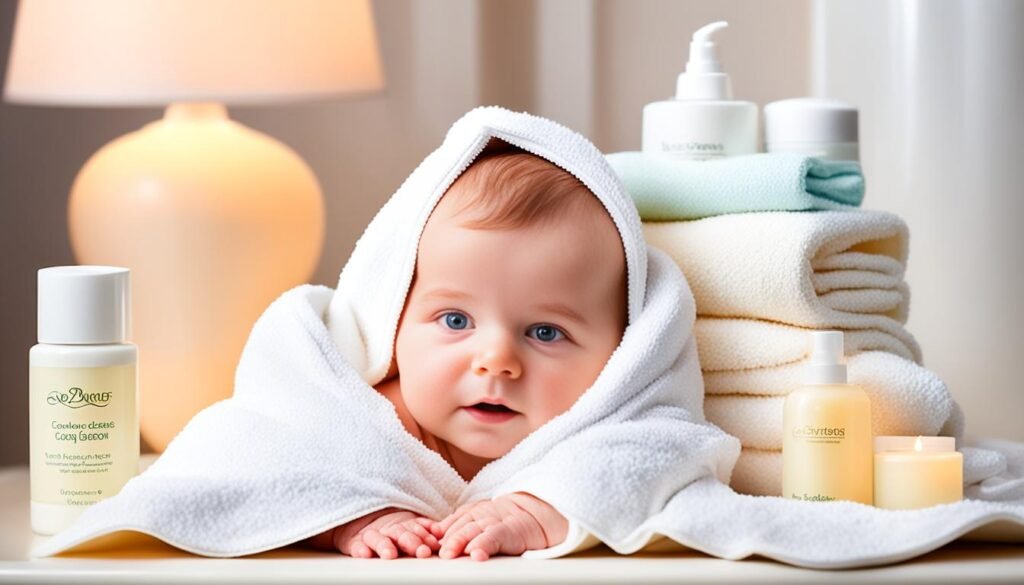Welcome to our article on gentle care for newborns with flaky skin. As a parent, it can be concerning to see your baby’s delicate skin experiencing dryness and flakiness. But fret not, because we have some valuable tips and remedies to help you soothe and nourish your little one’s skin.
Infant skin is much more sensitive and prone to dryness compared to adult skin. Understanding how to care for it properly is essential to ensure their comfort and overall well-being. In this section, we will discuss the importance of gentle care for newborns with flaky skin and provide you with some effective remedies.
Key Takeaways:
- Newborns can experience flaky skin due to their delicate and developing skin barrier.
- Gentle care and moisturization are vital to soothe and nourish their skin.
- Natural remedies and specific baby skincare products can help alleviate dryness.
- Bathing, clothing choices, and seeking professional guidance when needed are key aspects of caring for newborn flaky skin.
- Remember, every baby is unique, so pay attention to their individual needs and consult a professional if necessary.
Understanding Newborn Flaky Skin
Before we dive into remedies for flaky skin in newborns, it’s important to understand the common causes and ways to prevent dryness. Newborns have delicate and sensitive skin that requires special care and attention.
There are several factors that can contribute to flaky skin in newborns. One common cause is the adjustment period after birth. Babies spend months in the amniotic fluid, which helps protect their skin. When they are born, their skin goes through a natural process of adaptation. Additionally, the environment outside the womb can be drier and harsher, leading to dryness and flakiness.
Moreover, the vernix caseosa, a waxy substance that protects the baby’s skin in the womb, starts to peel off soon after birth. This shedding of the vernix can result in flaky patches on the baby’s skin.
To prevent and manage flaky skin in newborns, practicing good baby skin care is essential. Here are a few tips:
- Keep the skin hydrated: Apply a gentle and moisturizing baby lotion or oil regularly to keep the skin hydrated. Look for products that are specifically formulated for newborns and free from harsh chemicals or fragrances.
- Avoid over-bathing: Excessive bathing can strip the natural oils from the baby’s skin, making it more prone to dryness. Limit bathing to two or three times a week and use lukewarm water instead of hot water.
- Choose gentle baby care products: Opt for mild and hypoallergenic baby soaps, shampoos, and detergents to minimize skin irritation.
- Protect from extreme temperatures: Cold weather and excessive heat can contribute to dry skin. Keep your baby comfortable by dressing them in appropriate clothing and avoiding exposure to extreme temperatures.
Understanding the causes of flaky skin and following these baby skin care tips can help maintain the health and hydration of your newborn’s skin. In the next section, we will explore natural remedies that can soothe and nourish your baby’s delicate skin.
Nurturing Newborn Skin with Natural Remedies
When it comes to treating newborn flaky skin, natural remedies provide a gentle and effective solution. These remedies not only help moisturize the skin but also nourish it with essential nutrients. Here, we will discuss various natural remedies, including oils and moisturizers, that are safe for newborns. We will also address common skin conditions that newborns may experience and how these remedies can offer relief.
1. Natural Oils for Baby Dry Skin
One of the best ways to nourish and hydrate your baby’s skin is by using natural oils. Oils such as coconut oil, almond oil, and jojoba oil are gentle on newborn skin and provide deep hydration. Additionally, they contain essential fatty acids that help restore the skin’s protective barrier. Simply apply a small amount of oil onto your baby’s skin after a bath, gently massaging it in.
2. Homemade Moisturizers
You can also create your own moisturizer using natural ingredients. A simple recipe is to mix shea butter, cocoa butter, and a few drops of chamomile essential oil. Shea butter and cocoa butter are rich in vitamins and antioxidants that promote skin healing. Chamomile essential oil has soothing properties that can calm irritated skin. Apply this homemade moisturizer to your baby’s dry skin as needed.
3. Oatmeal Baths
An oatmeal bath can be incredibly soothing for newborns with dry and irritated skin. Oats contain compounds that help soothe inflammation and relieve itchiness. To make an oatmeal bath, grind a cup of oats into a fine powder and add it to your baby’s bathwater. Swirl the water to distribute the oatmeal evenly. Gently bathe your baby, allowing the oatmeal-infused water to soothe their skin.
4. Calendula for Common Skin Conditions
Calendula is a flower known for its healing properties and is often used to treat various skin conditions in newborns. It has anti-inflammatory and antimicrobial effects, making it beneficial for conditions like diaper rash or eczema. You can find calendula creams or lotions specifically formulated for infants. Apply a thin layer to the affected area to soothe and protect your baby’s skin.
“Natural remedies offer a gentle solution to treat newborn flaky skin while avoiding harsh chemicals.”
Remember, it’s essential to consult with your pediatrician before trying any new remedies on your baby’s skin, especially if they have a preexisting skin condition or sensitivity. By nurturing your newborn’s skin with natural remedies, you can help alleviate dryness and keep their delicate skin healthy and moisturized.
Moisturizing Techniques for Newborns
Proper moisturizing is crucial for maintaining hydrated skin in newborns. Their delicate skin requires special care and attention to prevent dryness and potential skin conditions like baby eczema. By following the right techniques and using suitable products, you can keep your baby’s skin soft and nourished. Here are some effective techniques to moisturize your newborn’s skin:
1. Apply a Gentle Moisturizer
Choose a gentle moisturizer specifically designed for infants with dry skin. Look for products that are free from harsh chemicals and fragrances. Apply the moisturizer after bathing, ensuring to cover the entire body while paying extra attention to dry areas. Massage the moisturizer in gentle, circular motions to promote absorption.
2. Use Natural Oils
Natural oils like coconut oil, almond oil, or jojoba oil can be excellent alternatives to commercial moisturizers. They provide hydration and nourishment to your baby’s skin without any additives or chemicals. Gently massage a small amount of oil onto your baby’s skin, focusing on areas prone to dryness.
3. Opt for Lukewarm Baths
Hot water can strip away the natural oils from your baby’s skin, leading to dryness. Instead, choose lukewarm water for baths. Keep the baths short (around 10 minutes) to avoid excessive moisture loss. Pat your baby’s skin dry with a soft towel and immediately apply moisturizer to lock in the moisture.
4. Humidify the Air
Dry indoor air can contribute to your baby’s dry skin. Use a humidifier in your baby’s room to add moisture to the air. This can help prevent excessive dryness and keep your baby’s skin hydrated.
5. Dress Your Baby in Soft Fabrics
Choose clothing made from soft, breathable fabrics like cotton or bamboo. Avoid rough materials or synthetic fabrics that can irritate your baby’s skin and worsen dryness. Additionally, be mindful of any laundry detergent or fabric softener you use, opting for hypoallergenic and fragrance-free options.

Remember, every baby is unique, and it may take some trial and error to find the best moisturizing routine for your little one. Pay attention to their skin’s response and consult a pediatrician if you notice any persistent dryness or skin conditions like baby eczema. With proper care and moisturizing, you can help keep your baby’s skin healthy and hydrated.
Bathing and Cleansing Tips for Newborn’s Skin
Bathing is an essential part of caring for your newborn’s skin. It not only helps maintain cleanliness but also promotes healthy skin. However, it’s important to handle bathing with care, especially if your baby has flaky skin.
Here are some useful tips on how to bathe a newborn with flaky skin:
- Keep bath time short: Limit the duration of baths to around 5-10 minutes to prevent excessive drying of the skin. Quick baths help retain the skin’s natural moisture.
- Use lukewarm water: Opt for lukewarm water instead of hot water, as it can further strip the skin of its natural oils. Test the water temperature with your elbow or wrist to ensure it’s comfortable for your baby.
- Gently cleanse the skin: Select a mild, fragrance-free, and hypoallergenic cleanser specially formulated for newborns. Avoid using harsh soaps or adult products that may irritate the delicate skin.
- Be gentle during cleansing: Use your hand or a soft washcloth to gently cleanse your baby’s skin. Avoid scrubbing vigorously, as it can worsen dryness and lead to irritation.
- Frequent baths not required: Newborns don’t typically get dirty or sweaty, so daily baths are unnecessary. Bathing 2-3 times a week is usually sufficient to keep your baby clean without over-drying the skin.
Remember, each baby is unique, and you may need to adapt these tips based on your little one’s needs. If you notice any redness, irritation, or worsening of dry skin after bathing, consult a pediatrician for further guidance.
“Bathing should be a soothing and enjoyable experience for both you and your baby. Take your time and create a calm atmosphere to help your little one relax.”
To prevent further dryness and promote healthy skin, consider the following additional tips:
- After bathing, gently pat your baby’s skin dry with a soft towel, avoiding any rubbing or friction.
- Apply a gentle moisturizer specifically formulated for infants with dry skin. Look for products that are free from fragrance, colorants, and harsh chemicals.
- Avoid using talcum powder or cornstarch on your baby’s skin, as it can lead to respiratory issues if inhaled.
- Dress your baby in loose-fitting, breathable clothing made of soft fabrics like cotton. Avoid synthetic materials that may irritate the skin.
- Keep the room temperature moderate and avoid exposing your baby to extreme heat or cold, as it can contribute to dryness.
By following these bathing and cleansing tips, you can provide gentle care for your newborn’s flaky skin, keeping it hydrated and healthy.
Clothing and Fabrics for Newborn’s Skin
When it comes to caring for your newborn’s delicate skin, the clothing and fabrics you choose play a crucial role. The right clothing can help prevent irritation and maintain their skin’s moisture balance. In this section, we will discuss appropriate clothing choices, fabric types that are gentle on newborn skin, and ways to avoid irritation.
Choosing the Right Clothing
1. Opt for soft, breathable fabrics: Look for clothing made from natural fabrics like organic cotton or bamboo. These materials are gentle on your baby’s skin, allowing it to breathe and reducing the risk of irritation.
2. Avoid harsh fabrics: Stay away from synthetic fabrics, such as polyester and nylon, which can trap heat and moisture, leading to discomfort and potential skin problems.
3. Select loose-fitting garments: Loose-fitting clothes reduce friction against your baby’s skin, minimizing the risk of irritation and chafing. Ensure the clothing is not too tight, especially around the neck, waist, and diaper area.
Preventing Irritation
1. Wash new clothes before use: New garments may contain chemicals, dyes, or residual irritants from the manufacturing process. Wash them in a gentle, fragrance-free detergent to remove any potential irritants before dressing your baby.
2. Avoid clothing with embellishments: Ruffles, sequins, or excessive decorative elements can rub against your baby’s skin, causing irritation. Opt for simple, fuss-free clothing designs.
3. Skip the fabric softeners: Fabric softeners may contain fragrances or additives that can irritate your baby’s skin. Instead, opt for fragrance-free laundry detergent and skip the fabric softener altogether.

Quotes
“Choosing the right clothing and fabrics for your baby is vital in maintaining their skin’s health and comfort.” – Dr. Emily Johnson, Pediatric Dermatologist
Seeking Professional Guidance
In some cases, newborn flaky skin may require professional attention. If your baby develops persistent or severe skin conditions, it is important to consult a pediatrician or dermatologist for an accurate diagnosis and appropriate treatment.
Qualified medical professionals have the expertise to identify and address various newborn skin conditions, including baby eczema, which can be challenging to manage without professional guidance.
When seeking professional help, it’s crucial to provide detailed information about your baby’s symptoms and medical history. This will assist the healthcare provider in making an informed diagnosis and recommending the most suitable baby eczema treatment or other therapeutic measures.
Remember, each baby is unique, and what works for one may not work for another. A professional can tailor an individualized treatment plan based on your baby’s specific needs and condition.

Consulting a medical expert ensures that you receive accurate information, proper guidance, and peace of mind regarding your baby’s skin health. It is always better to seek professional advice rather than relying solely on self-diagnosis or non-medical sources.
Conclusion
This article has provided valuable tips and remedies to gently care for newborns with flaky skin. By following these suggestions, you can help keep your baby’s skin soft, nourished, and free from dryness.
Remember, every baby is unique, so it’s important to consider your infant’s individual needs. If you have any concerns or if the flaky skin persists, it’s always best to consult a pediatrician or dermatologist for professional advice and appropriate treatment.
By adopting a gentle skincare routine, using natural remedies, and paying attention to bathing, moisturizing, clothing, and fabrics, you can promote healthy skin for your precious little one. With your love and care, your baby’s delicate skin will thrive and flourish.
FAQ
Why does my newborn have flaky skin?
Newborns commonly have flaky skin due to the natural shedding of their vernix caseosa, a waxy substance that protects their skin while in the womb. It usually clears up within a few weeks.
How can I prevent my baby’s skin from becoming overly dry?
To prevent dryness, ensure proper hydration by keeping your baby well-fed and offering frequent breastfeeding or formula feeding. Additionally, keep your baby’s environment humidified, avoid using harsh soaps or products, and dress them in breathable, cotton clothing.
Are there any home remedies for treating newborn flaky skin?
Yes, there are several natural remedies you can try. Applying a small amount of coconut oil or almond oil to your baby’s skin can help moisturize and nourish their delicate skin. Be sure to test on a small patch of skin first and discontinue use if any signs of irritation occur.
Can I use regular moisturizers on my newborn’s skin?
It’s best to use moisturizers specifically formulated for newborns, as their skin is more sensitive. Look for fragrance-free, hypoallergenic, and pediatrician-recommended products to ensure that they are gentle and safe.
How often should I bathe my newborn with flaky skin?
It is recommended to bathe your newborn every 2-3 days to prevent their skin from drying out. Use lukewarm water and mild, fragrance-free cleansers. Keep the bath time short (5-10 minutes) and gently pat their skin dry with a soft towel afterward.
What fabrics should I choose for my baby’s clothing?
Opt for soft and breathable fabrics like cotton, as they are less likely to irritate your baby’s sensitive skin. Avoid rough fabrics and choose loose-fitting clothes to allow air circulation.
When should I consult a professional about my baby’s flaky skin?
If your baby’s flaky skin persists or worsens, becomes red or inflamed, or if your baby shows signs of discomfort or itching, it’s recommended to consult a pediatrician or dermatologist. They can provide an accurate diagnosis and recommend appropriate treatment if necessary.

